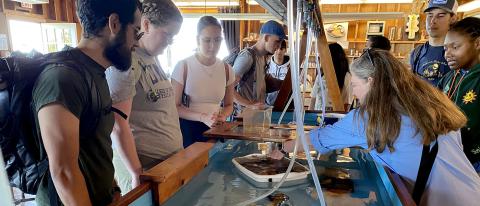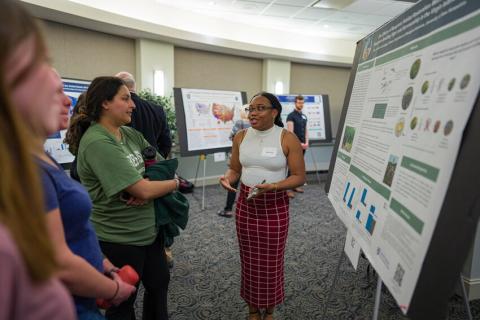
REU: Sensors in Earth, Oceans, and Space Science –
How We Observe Our Planet
Our primary goal is to provide a positive introduction to sensor-based Earth and space science research for underserved student populations.
What makes this REU program unique?
- Research opportunities in Earth, Oceans, and Space: Sensors are used across many fields of Earth, Space and Ocean sciences. This REU program is hosted by UNH’s Institute for the Study of Earth, Oceans, and Space, providing research projects and mentors in all three of these scientific fields.
- Focus on sensors and cutting-edge data science skills: Learn to harness the data revolution! In this REU, you will develop skills to collect, analyze, and interpret data from a wide range of sensors used in science. This includes sensors deployed in ocean settings, forests, rivers, and even satellites in space. Data analysis using programming and statistics are core skills taught by leading scientists.
- Professional development activities: In addition to learning scientific research skills, you will present a research poster to peer researchers at a multi-internship end of summer symposium. This REU will also provide weekly lunch discussions with scientific professionals in academia, industry, and government, giving you a chance to learn about the myriad career pathways opened by STEM degrees.
- Open to students of all levels and majors: This REU is open to undergraduate students of all levels and majors, including undecided/undeclared majors.
REU 2026 Schedule
Program Dates
June 1 – August 7
Application Deadline
February 9
Matchmaking Interviews
February 2026
Acceptance Notice
March 2026
If you have technical difficulties with the NSF ETAP application website, you can apply by emailing:
- The 2026 Application Document
- Your resume
- Two reference letters
To: eos.reu@unh.edu or Amy.Keesee@unh.edu
By: Monday, February 9, 2026
(12:00 midnight applicant's time)
Frequently Asked Questions

An REU is a “Research Experience for Undergraduates,” and is a program sponsored by the National Science Foundation. The goal of all REU programs is to provide authentic research experiences for undergraduate students. Here, we aim to help students identify if STEM majors and careers are right for them. You can find more information on all REUs and search for other REU programs here.
Each student will work on a specific project with a faculty mentor. See below for project descriptions and mentor profiles. Over the course of 10 weeks, you will learn about the research questions that can be addressed by the type of sensors used in your mentor’s lab, how to collect, maintain, and analyze data, and finally how to present your findings to peers. Many projects will involve computer programming skill building, and some will include field and/or lab work. You will also learn about data stewardship, research integrity, and collaborative science. REU students will work alongside graduate students, post-doctoral researchers, and other scientific professionals.

The University of New Hampshire main campus in Durham, NH. All REU students will have housing on campus, and mentor labs are all in UNH’s Institute for the Study of Earth, Oceans, and Space. Some projects may involve field work off-campus; transportation will be provided for all required fieldwork.

Yes! This REU program provides on-campus housing, meals, and a $6,000 stipend for each student.
Applicants must be U.S. citizens or permanent residents and at least 18 years of age at the time of the REU program. This REU program is open to all majors – including undecided or undeclared majors – as well as undergraduate students at all levels of study (freshman, sophomore, etc). We welcome applications from students in 2-year courses of study. The main goal of this REU program is to provide research experiences to underserved student populations. This includes underrepresented minority groups in STEM, veterans, individuals with differing abilities, and people from low socioeconomic status. Underrepresented minority groups in STEM are defined by the NSF as: Blacks and African Americans, Hispanics and Latinos, and American Indians including Alaskan Natives and Native Pacific Islanders.
Projects and Mentors
Marine microbes cover a diversity of organisms that account for more than 98% of ocean biomass. They are fundamental for oceanic food webs and thus ecosystem function and services. Research within the Ocean Process Analysis Laboratory aims to understand microbial and biogeochemical processes and their role in the cycling of growth-limiting nutrients (e.g., nitrogen and phosphorus) as well as organic and inorganic carbon in marine environments. REU students will be involved with field measurements in the Gulf of Maine and its estuaries, and with laboratory research focusing on microbial growth and metabolic rates along with carbon chemistry, and how these rates and parameters are affected by anthropogenic stressors such as ocean acidification, sea surface warming, and ocean pollutants (e.g., microplastics, spilled oil). Students will gain skills in marine sensor deployment, lab incubation methods, and statistical data analysis.
Mentor: Dr. Kai Ziervogel
Acoustic waves can be a powerful tool to learn about our oceans. The Acoustic Characterization and Experimentation (ACE) Lab employs a wide range of physics-based field, laboratory, and modeling methodologies to extract useful information from underwater sound to learn more about underwater ecosystems, particularly those that live on the seabed (i.e. seagrasses). Depending on your interests, you may choose between projects that contain big data, coastal field work, or laboratory work using real acoustic sensors and statistical/machine learning signal processing techniques.
Mentor: Dr. Gabriel R. Venegas
Eelgrass plays a pivotal role in improving water quality. Despite significant reduction in pollution, inorganic (e.g., nitrogen) and organic materials being released from wastewater treatment plants across municipalities, eelgrass coverage of the Great Bay Estuary has decreased over the last decades. Emerging floating seaweed coupled with invasive species further restricts their growth, reproduction, and survival. As a part of an ongoing project funded by Environmental Protection Agency (EPA), the main objective of this summer project is to gain key factor(s) controlling on eelgrass through comprehensive measurements and analyses using optical, physical, biological, and biogeochemical variables. Together with remote sensing data, this will guide us to improve the present eelgrass situation by enhancing our understanding of eelgrass relevant processes from a point-base to a broader spatial scale. Interns will be directly involved in various activities including boat trips, tank experiments, lab work, and data analysis.
Mentors: Atsushi Matsuoka and Lara Martin
Marine pathogens spread quickly and can decimate important coastal ecosystems like seagrass meadows and coral reefs. The loss of ecosystems impacts coastal communities and economies that rely on these marine organisms and their ecosystem services. In this project, students will explore how the flow of water can drive the spread of these diseases, either by causing plant-to-plant contact in seagrass meadows or by transporting tissue fragments or sediment between diseased corals. This project will involve synthetic physical systems and a laboratory flume, or mathematical modeling of marine epidemiology. Possible skills students will develop include 3D solid modeling or 3D printing, quantitative imaging, mathematical modeling, and data analysis.
Mentor: Dr. Tracy Mandel
Winter is the fastest warming season across most of the United States, with New England emerging as a winter warming hot spot. In this summer REU project, we will explore historical and future climate projections of winter climate indicators relevant to ecosystems and society. Data analysis will include observations from long-term sensors and comparison with gridded model output. REU students will learn how to approach big data from multi-model climate ensembles and generate data visualizations relevant to interest holders in wildlife management, outdoor recreation, forestry, or more!
Mentor: Dr. Elizabeth Burakowski
Our technology-driven society is dependent upon satellite technology for communication, navigation, and national security, as well as upon a reliable power grid for everyday needs such as money transactions, job functions, and food storage. These infrastructure systems are vulnerable to geomagnetic activity, when charged particles in the space surrounding Earth are energized and transported due to energy input from the Sun. Researchers in the Space Science Center use satellite- and ground-based sensor data to study the particles and fields in this region of space. Emerging machine-learning methods are being tested to evaluate their ability to use these datasets to model geomagnetic storms and predict when these events could cause power outages and other disruptions. REU students in the Space Science Center will conduct a project that incorporates one or more of these data sets. Skill development may include satellite and/or ground data processing, data visualization, and machine learning methods.
Mentor: Dr. Amy Keesee